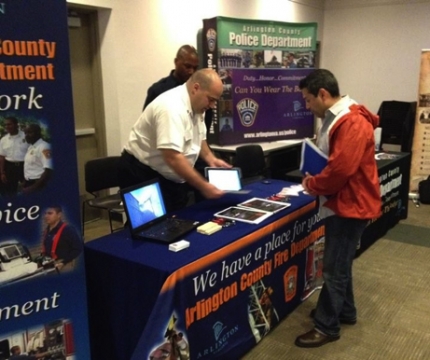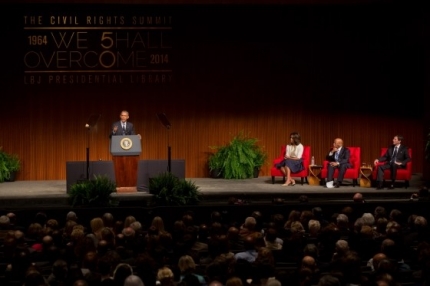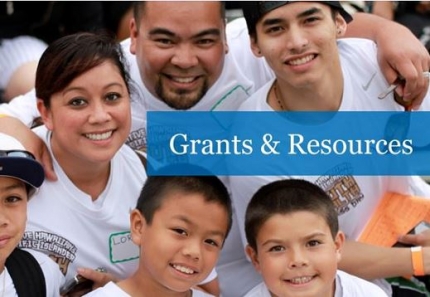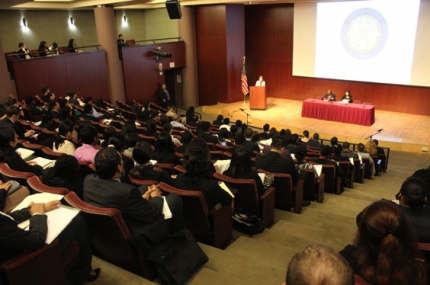Initiative on Asian Americans and Pacific Islanders Blog
AAPIs Supporting Veterans Through Action and Service
Posted by on July 2, 2014 at 4:24 PM ESTEd. note: This is cross-posted on the Joining Forces blog. See the original post here.
As the Fourth of July weekend approaches, Americans everywhere will gather to celebrate the birth of our nation with a traditional fireworks display, a nice barbecue, or by spending time with family and friends. The Fourth of July is also a time to honor the patriotism and dedication of our military and their families.
There is no greater debt than the one owed to our service members, as well as the families of those who have sacrificed so much for the freedoms we enjoy. I often reflect on those who have given us so much throughout history, as well as the thousands of service members who are still in harm’s way today. We should never forget that the freedoms we sometimes may take for granted in our nation were paid for in lives.
I recently met a veteran who embodies this spirit and more. Saif Khan honors veterans the best way he knows how — through action. Saif invests in our nation by leading a non-profit organization dedicated to helping veterans and their families with employment opportunities. He believes that the best way to show appreciation for our veterans is to "pay it forward" for our next generation, and provide support for those returning home to their communities.
Saif emigrated to the U.S. from India as a child and joined the Virginia Army National Guard after high school. He served as a Combat Engineer in Mosul, Iraq, during Operation Iraqi Freedom from 2004 to 2005. Since returning from Iraq, Saif has been a strong advocate for veterans, and has worked with senior military leaders and legislators to identify problems returning veterans of the wars in Iraq and Afghanistan face. Saif has also been active in helping military families with employment opportunities; in May, he organized a career resource fair to match veterans and military families with recruiters from local law enforcement and emergency response agencies.
Saif and the many thousands of Americans who have dedicated their efforts to supporting our returning veterans fill me with pride, hope, and a sense of optimism for our nation. It’s important that we ensure no veteran has to fight for a job at home after they fight for our nation overseas. As more and more AAPIs answer the call to serve, we must follow Saif’s example and ensure returning veterans have the opportunity to prosper in their hometown communities. It’s imperative that they have access to employment resources, educational opportunities, and health and wellness services when they return home. President Obama has made it a national priority to ensure that military members and their families are cared for, and many organizations are engaging in the type of work Saif does every day.
Getting Involved with Joining Forces
Three years ago, First Lady Michelle Obama and Dr. Jill Biden started Joining Forces to show their appreciation for the incredible families across America who do so much for our country — not just with words, but with real, concrete action. Joining Forces is a national initiative to engage all sectors of society to support our service members. The initiative brings attention to the unique needs and strengths of America’s military families and showcases the incredible skills and experience of veterans and military spouses. Joining Forces encourages concrete actions and for all Americans to "step up" and show their gratitude to our service members and their families through action.
In April, the First Lady and Dr. Biden launched the Veterans Employment Center (VEC) website. The VEC is the result of extensive interagency collaboration between the Department of Defense, Department of Labor, Department of Veterans Affairs, and other federal partners. It is designed to provide veterans and transitioning service members a “one-stop shop” website to post resumes, translate their military skills, and search for jobs. Additionally, the VEC enables employers to post jobs and search veteran resumes for potential hires — it’s a huge leap ahead, both for veteran job seekers and for employers looking to hire veterans.
This Fourth of July, we should remember that the fiber of the American mosaic is woven by diverse communities represented in our Armed Forces. In the coming years, we must focus on supporting the hundreds of thousands of veterans seeking opportunities after returning to their local communities. Saif is the perfect example of an AAPI leader who is doing this. He is "paying it forward" for America every day, and our nation will be all the better for it.
To learn more about how you can support military members and their families, visit the Joining Forces website at http://obamawhitehouse.archives.gov/joiningforces.
Lt. Col. Ravi Chaudhary is a member of the President’s Advisory Commission on Asian Americans and Pacific Islanders.
Learn more about VeteransReflecting on 50 Years of the Civil Rights Act of 1964
Posted by on July 2, 2014 at 4:20 PM ESTToday, July 2, 2014, marks the 50th anniversary of the Civil Rights Act of 1964, the landmark legislation signed by President Lyndon B. Johnson outlawing discrimination based on race, color, religion, sex, or national origin.
Thanks to the law, the civil rights movement that spurred it, and the progress made since, new doors of opportunity have opened for all Americans, including Asian Americans and Pacific Islanders.
AAPIs are now the fastest growing racial group in the United States, and the community’s needs are diverse and complex. AAPIs continue to face challenges such as employment discrimination, hate crimes, limited English proficiency, and more.
That’s why in 2009, President Obama reestablished the White House Initiative on Asian Americans and Pacific Islanders (AAPIs). The Initiative works to improve the quality of life for AAPIs through increased access to and participation in federal programs ranging from education and health to economic growth and immigration. Under President Obama, the Initiative has reached over 30,000 people at more than 200 roundtables, stakeholder meetings, and summits in 25 states, the District of Columbia, and the Pacific Islands. Across the federal government, the Initiative has worked to increase awareness of how to report discrimination, bullying, and harassment. It held in-language Google+ Hangouts on the Affordable Care Act in Korean, Vietnamese, and Mandarin Chinese. And the Initiative is working across federal agencies to implement, monitor, and enforce the language access requirements of Title VI of the Civil Rights Act of 1964 and Executive Order 13166.
The 50th anniversary of the Civil Rights Act is an important opportunity to look back and celebrate the great accomplishments of the civil rights movement. It is also a moment to recommit to the work that remains, as noted by President Obama in a proclamation celebrating the occasion:
As we reflect on the Civil Rights Act and the burst of progress that followed, we also acknowledge that our journey is not complete. Today, let us resolve to restore the promise of opportunity, defend our fellow Americans' sacred right to vote, seek equality in our schools and workplaces, and fight injustice wherever it exists. Let us remember that victory never comes easily, but with iron wills and common purpose, those who love their country can change it.
Kiran Ahuja is Executive Director of the White House Initiative on Asian Americans and Pacific Islanders.
Navigating Federal Grants, Training, and Resources
Posted by on June 30, 2014 at 2:35 PM ESTThe White House Initiative on Asian Americans and Pacific Islanders is pleased to announce our new Grants and Resources website dedicated to providing tools and resources to inform AAPI community-based organizations about federal opportunities.
The Grants and Resources website serves as a hub of current grant and technical assistance information.
The website is divided into three main sections:
1) Grants: The grants page offers tools to help organizations navigate Grants.gov and the grant application process.
2) Training: Under the training section, we share learning opportunities offered by federal agencies to help organizations obtain and use their resources.
3) Resources: This page provides tools to help your organization with everything from assessing community needs to conducting evaluations.
The Grants and Resources website is not meant to be completely exhaustive nor will it have every opportunity listed from the federal government, but we hope to share information AAPI organizations and communities will find of interest. The Initiative is not involved with the decisions made by the organizations issuing the grant, nor does an organization’s usage of our website guarantee that an application will be approved.
Upcoming opportunities include:
- Grantwriting Training for Minority Serving Institutions
- U.S. Department of Housing and Urban Development with the Center for Faith-Based and Neighborhood Partnerships – Capacity Building/Grant Writing Training Session (Wednesday, July 16 at Temple University)
- Institute of Education Sciences: Webinar Series on Funding Opportunities
I encourage you to share the new website and continue to check it for the most up-to-date information on these opportunities.
Kiran Ahuja is Executive Director of the White House Initiative on Asian Americans and Pacific Islanders.
Rebuilding Livelihoods in the Philippines Post-Typhoon Haiyan
Posted by on June 13, 2014 at 10:35 AM ESTEd. note: This is cross-posted on the U.S. Agency for International Development (USAID) blog. See the original post here.
On November 8, 2013, Super Typhoon Haiyan made landfall in the Philippines and affected 16 million people, killing thousands and displacing millions.
Entire villages and cities were destroyed, but the rebuild effort began quickly thanks to a global response.
The U.S. Agency for International Development (USAID) and the U.S. military were the first to deliver life-saving support, including the provision of emergency shelter, food assistance, relief commodities, and water and sanitation support. To date, the U.S. Government has provided over $90 million in aid.
Seven months later, humanitarian efforts are ongoing. An estimated 5.6 million workers have seen their livelihoods affected and many of them still need assistance. Schools opened on June 2 but thousands of children returned to classrooms that have been destroyed or damaged. Millions of people still require shelter.
Late last month, I had the opportunity to see the recovery efforts firsthand during a visit to the island of Leyte, home to Tacloban — the epicenter of the storm. Tacloban City was completely obliterated, leaving only tents, makeshift “squatter” living conditions and other sorts of temporary housing all around, with signs of destruction in between.
But massive clean up efforts had taken place over the last six months with piles of somewhat organized garbage and debris scattered everywhere. Organizations and work crews were still cleaning up while I was there, repairing houses that could be fixed, and building new homes from scratch.
Sharing Federal Career Opportunities with AAPI Youth Through the New York Regional Interagency Working Group Youth Conference
Posted by on June 6, 2014 at 8:23 AM ESTThe Asian American and Pacific Islander (AAPI) community is the fastest-growing racial group in the country. From 2000 to 2010, our community has grown by 46%, and by 2020, almost one out of every five (19.5%) Americans will be of AAPI descent. While the ethnic makeup of our nation is diversifying, AAPI leadership and representation in the federal government is lacking. Currently, only 5.6% of the federal workforce is of AAPI descent and AAPIs represent a mere 4.4% of the Senior Executive Service (SES). The White House Initiative on Asian Americans and Pacific Islanders (Initiative) is committed to collaborating with community organizations, federal agencies, and college and university students to increase the AAPI voice in all levels of the federal government.
On Thursday, May 22, 2014, I had the privilege of speaking at the New York Regional Interagency Working Group (RIWG) Youth Conference for college and university students interested in careers in public service and the federal government. More than 240 students and career advisors attended, representing over 20 universities and colleges throughout the region. The conference provided a valuable opportunity for students to connect with representatives from government agencies and learn about the assortment of programs and career opportunities that they offer. It was exciting for me to meet so many talented and driven students.
Learn more aboutHonoring the Legacy of Yuri Kochiyama
Posted by on June 6, 2014 at 8:10 AM ESTToday, we honor the legacy of Yuri Kochiyama, a Japanese American activist who dedicated her life to the pursuit of social justice, not only for the Asian American and Pacific Islander (AAPI) community, but all communities of color.
Mary Yuriko Nakahara was born in 1921 in San Pedro, California. She and her family spent two years in an internment camp in Jerome, Arkansas during World War II, and the similarities she saw between the treatment of Japanese Americans during World War II and African Americans in the Jim Crow South inspired her to dedicate her life to activism on behalf of marginalized communities. In the early 1960s, Yuri and her husband Bill Kochiyama, a decorated veteran of the all-Japanese American 442nd Regimental Combat Team of the U.S. Army, enrolled in the Harlem “freedom schools” to learn about black history and culture. Soon after, Yuri began participating in sit-ins and inviting Freedom Riders to speak at weekly open houses in the family’s apartment. She was a strong voice in the campaign for reparations and a formal government apology for Japanese American internees through the Civil Liberties Act, which President Ronald Reagan signed into law in 1988.
Yuri leaves behind a legacy of courage and strength, and her lifelong passion for justice and dedication to civil rights continue to inspire young AAPI advocates today. I am moved by her leadership and her unwavering commitment to building coalitions to improve the quality of life and opportunities for all Americans, regardless of background.
Learn more about Civil Rights
- &lsaquo previous
- …
- 10
- 11
- 12
- 13
- 14
- 15
- 16
- 17
- 18
- …
- next &rsaquo
White House Blogs
- The White House Blog
- Middle Class Task Force
- Council of Economic Advisers
- Council on Environmental Quality
- Council on Women and Girls
- Office of Intergovernmental Affairs
- Office of Management and Budget
- Office of Public Engagement
- Office of Science & Tech Policy
- Office of Urban Affairs
- Open Government
- Faith and Neighborhood Partnerships
- Social Innovation and Civic Participation
- US Trade Representative
- Office National Drug Control Policy
categories
- AIDS Policy
- Alaska
- Blueprint for an America Built to Last
- Budget
- Civil Rights
- Defense
- Disabilities
- Economy
- Education
- Energy and Environment
- Equal Pay
- Ethics
- Faith Based
- Fiscal Responsibility
- Foreign Policy
- Grab Bag
- Health Care
- Homeland Security
- Immigration
- Innovation Fellows
- Inside the White House
- Middle Class Security
- Open Government
- Poverty
- Rural
- Seniors and Social Security
- Service
- Social Innovation
- State of the Union
- Taxes
- Technology
- Urban Policy
- Veterans
- Violence Prevention
- White House Internships
- Women
- Working Families
- Additional Issues




